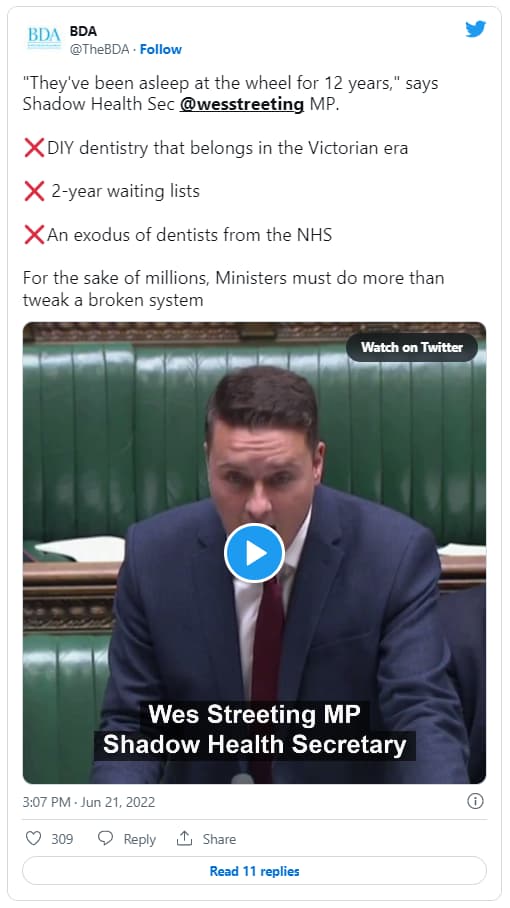Twice within 24 hours MPs gathered to demand urgent reform of NHS dentistry from the Government. Speaking to Parliamentarians across the Government and opposition benches, we’ve worked to spell out the crisis facing the service, armed with evidence from our members.
Over the two debates most MPs quoted evidence on the exodus from NHS dentistry from their own constituents. Almost every speaker reported cases of patients falling back on DIY dentistry. “We are not just facing a return to Dickensian Britain; we are already there” noted Shadow Public Health Minister Feryal Clark MP.
What we heard from MPs - and in response from Ministers - outlines where we’re heading in the weeks and months ahead:
1) Coming soon: A 100% target
With 1 July just days away, Health Secretary Sajid Javid effectively revealed where we’re likely heading for Q2. “We are planning to return to 100% shortly” he told MPs, in what must be the worst kept secret in Westminster.
Javid effectively revealed where we’re likely heading for Q2.
With IPC guidance parked, it’s not hard to guess where we’re heading. However, it is abundantly clear dentistry has not returned to ‘business as usual’. There have been so many unanswered questions, and practices will still face challenges, and likely with no wriggle room.
We are now seeing what the ‘new normal’ looks like in a post-pandemic world, where colleagues will continue to face real burdens, without corresponding government support.
Official confirmation is yet to come, but this teaser trailer means we might forgo the traditional 11th hour announcements.
These choices will come at a cost. And it’s clear the Government will continue to reap what it’s sowed when it comes to the NHS workforce.
2) Funding remains the elephant in the room
“We have made sure the NHS has the right level of resourcing to face the future with confidence” the Health Secretary told MPs. That isn’t necessarily a picture many dentists would recognise after a decade of savage cuts and given the simple fact that not a penny of the extra billions pledged to the wider NHS has been earmarked for ongoing support for dentistry.
“We intend to go much further to build a truly 21st-century offer in primary care” he continued. How that is possible on a flatlining budget is anyone’s guess.
The gulf between soundbites and reality was plain to see. That’s why we are firmly focused on the next stage
However, attention turned to the ‘dental treatment blitz’, with MPs on both sides of the House speaking candidly about its limitations of the supposed £50m investment.
We know uptake was limited, and MPs have been offered no clarity. When pressed on the specifics the Health Secretary stated that “millions” were drawn down for the £50m pledged, and rather than the 350,000 promised it translated into “tens of thousands of appointments.”
The gulf between soundbites and reality was plain to see. The Government has set many laudable objectives for reform – improving access, addressing inequality, making prevention a reality – but they will be impossible to deliver if they are predicated on an inadequate, standstill budget.
3) Change is coming, but it’s modest and marginal
MPs have been told that ‘change is coming’. To be clear, contract reform is not coming this side of summer. If we do see an announcement, it will be on modest, marginal changes to the current discredited system. Negotiations on the fundamentals have yet to begin.
The Minister told MPs “we put the final offer to the BDA on 20 May”. We do hope that wasn’t an attempt to deflect from the glacial pace of change and we hope that this isn’t a final offer as these proposals will not make the current dysfunctional contract history. It would be overgenerous to use the word ‘reform’ here. And that’s why we are firmly focused on the next stage.
4) Real reform remains essential
This will be a test of the government's ambition. Will Ministers provide the resources and reform that millions of patients require, or will they consider a few tweaks to a broken model as mission accomplished? If they don’t, MPs have already given a sense of where we’re heading. It’s what they’re already seeing in their constituencies. Patients in pain left without options, a mounting exodus from the workforce, and widening oral health inequality.

As St Ives MP Derek Thomas noted - reflecting views from both sides of House - “it is not enough to be seriously planning reform. We must be planning serious reform.” These problems predate COVID, and as many opposition MPs were keen to point out despite the fact both major parties went into the 2010 general election pledging reform, 12 years on and we’re no closer.
“We need to restore adequate funding to dentistry in England, and we need a commitment that the long-promised contract reform will take place” said Sheffield’s Paul Blomfield. “It must be real reform, and not tweaks at the edges. Otherwise, we face the slow death of NHS dentistry.” It’s a sobering but entirely accurate warning. Tweaking a contract that is simply not fit-for-purpose will not be enough to resolve this crisis.
The bottom line for fixing NHS dentistry is binning the UDA.
It is our ambition to have that reformed contract ready for April 2023, and we hope NHS England will match that ambition. The bottom line for fixing NHS dentistry is binning the UDA. There can be no future for it in any reformed contract.
We have proposed a capitation-based contract that supports dentists to provide care for their cohort of patients with a clinical pathway that aligns with the dentistry we were taught at dental school, and, crucially, which gives us the time to deliver proper prevention. Those capitation payments need to be weighted to reflect patient need so that we remove the perverse disincentives that punish practices for taking on high-needs patients.
We have the solutions to the problems NHS dentistry is facing. The stakes are high, and in the year ahead we will see if the Government is ready and willing to do what needs to be done.

